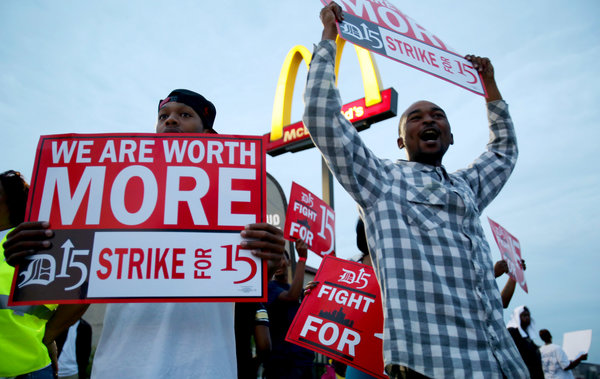Nathaniel’s recent post on minimum wage touches on a couple of important–if not overlooked–points about the “job creation” debate: (1) innovation vs. job preservation and, implicitly, (2) wealth vs. jobs. If the goal is to create jobs for the sake of creating jobs, then the task is pretty straightforward.
As economist Steven Horwitz says above, “I would argue that creating jobs is easy; it’s the creation of wealth that’s hard.” The creation of wealth is intrinsically linked with innovation and the “creative destruction” it brings about. Even though many have partaken of what Scott Winship of the Brookings Institution calls “technophobia” (remember Jesse Jackson Jr.’s claim that the iPad was “eliminating thousands of American jobs” or the President’s concern that the ATM represented a “structural issue” in the American economy?), the fear is unjustified.
Arguing against technological progress because it “destroy jobs” ignores the mass benefits that will follow, including the rise in absolute standards of living. “In a free-market economy,” explains historian Thomas E. Woods,
businesses invest the vast bulk of their profits in capital goods that make labor more productive…[Different] kinds of machinery can multiply the efficiency of a single worker many times over, sometimes by orders of magnitude…This is how wealth is created: we can produce more with the same (or a lesser) amount of labor…As a result of capital investment, firms can now produce many, many times more goods than before, and at considerably lower cost. Thanks to the pressures of market competition, firms pass on these cost cuts to consumers in the form of lower prices, better quality merchandise, or a combination of both. The ordinary person’s standard of living increases…because business firms can invest in machinery that makes it possible for more and more goods to be produced with fewer and fewer hands, thereby increasing the overall amount of material goods available and rendering them less and less expensive.[ref]Thomas E. Woods, Jr., 33 Questions About American History You’re Not Supposed to Ask (New York: Three Rivers Press, 2007), 168.[/ref]
A higher minimum wage will not help raise the poor out of poverty. It will simply eliminate jobs for low-wage workers (i.e. high school education and less).
But couldn’t one argue that technological advances eliminate low-wage jobs? Sure. But the difference is that minimum wage laws provide only a slight financial bump for some low-wage workers, while keeping others in the unemployment line. Innovation creates new jobs for low-wage workers, while raising the absolute standards of living for everyone (including the poor). When given these options, I would hope the choice is obvious.







